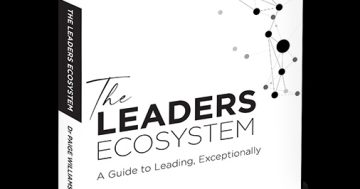Travis Bradberry* lists the most important qualities that set some employees above the rest – they have nothing to do with university degrees or years of experience.
 A recent international study surveyed more than 500 business leaders and asked them what sets great employees apart.
A recent international study surveyed more than 500 business leaders and asked them what sets great employees apart.
The researchers wanted to know why some people were more successful than others at work.
The answers were surprising; leaders chose ‘personality’ as the leading reason.
Notably, 78 per cent of leaders said personality sets great employees apart, more than cultural fit (53 per cent) and even an employee’s skills (39 per cent).
The problem is, when leaders say ‘personality’ they don’t understand what they’re referring to.
Personality consists of a stable set of preferences and tendencies through which we approach the world.
Being introverted or extroverted is an example of an important personality trait.
Personality traits form at an early age and are fixed by early adulthood.
It is distinct from intellect (or IQ).
The two don’t occur together in any meaningful way.
Personality is also distinct from emotional intelligence (or EQ), and this is where the study, and most leaders for that matter, have misinterpreted the term.
The qualities that leaders in the study called personality were actually emotional intelligence skills.
Unlike your personality, which is set in stone, you can change and improve your EQ.
Exceptional employees don’t possess God-given personality traits; they rely on simple, everyday EQ skills that anyone can incorporate into their repertoire.
Leaders don’t need to go searching for these skills either.
Their duty is to help everyone on their team harness these skills to become exceptional.
These are the skills that set exceptional employees apart.
They’re willing to delay gratification
One thing an exceptional employee never says is: “That’s not in my job description.”
Exceptional employees work outside the boundaries.
They’re neither intimidated nor entitled.
Instead of expecting recognition or compensation to come first, they forge ahead in their work, confident they’ll be rewarded later, but unconcerned if they’re not.
They can tolerate conflict
While exceptional employees don’t seek conflict, they don’t run away from it either.
They’re able to withstand personal attacks in pursuit of a greater goal and never use that tactic themselves.
They focus
Student pilots are often told: “When things start going wrong, don’t forget to fly the plane.”
Exceptional employees understand the principle of ‘just fly the plane’.
They don’t get distracted by cranky clients, inter-office squabbles, or switches to a different brand of canteen coffee.
They can differentiate between real problems and background noise.
They’re judiciously courageous
Exceptional employees are willing to speak up when others are not.
This is whether to ask a difficult question or to challenge an executive decision.
However, they think before they speak and wisely choose the best time and place to do so.
They’re in control of their egos
Exceptional employees have egos.
While that’s part of what drives them, but they never give their egos more weight than what is deserved.
They’re willing to admit when they’re wrong and willing to do things someone else’s way.
They’re never satisfied
Exceptional employees have unparalleled convictions that things can always be better.
No one is ever done growing, and there is no such thing as ‘good enough’ when it comes to personal improvement.
No matter how well things are going, exceptional employees are driven to improve, without forgetting to give themselves a healthy pat on the back.
They recognise when things are broken and fix them
Whether it’s a sticky desk drawer or an inefficient, wasteful process affecting the cash flow, exceptional employees don’t walk past problems.
“Oh, it’s been that way forever,” simply isn’t in their vocabulary.
They’re accountable
If you’re a manager trying to decipher a bungled report, “it’s not my fault” is the most irritating phrase in the English language.
Exceptional employees are accountable.
They own their work, their decisions, and all of their results — good or bad.
They’re marketable
‘Marketable’ can mean many things.
Inside the organisation, it means ‘likeable’.
Exceptional employees are well liked by co-workers.
They have integrity and leadership skills that people respond to.
Externally, it means they can be trusted to represent the brand well.
Managers know they can send these employees out to meet clients and prospects without worrying about what they’ll say or do.
They neutralise toxic people
Exceptional employees control their interactions with toxic people by keeping their feelings in check.
When they need to confront a toxic person, they identify their own emotions and don’t allow anger or frustration to fuel the chaos.
They also consider the difficult person’s standpoint and are able to find solutions and common ground.
Take notice of what’s not mentioned: Coding skills, years of experience, business degrees, etc.
These things matter, but they won’t make you exceptional.
*Travis Bradberry is the award-winning co-author of the bestselling book, Emotional Intelligence 2.0, and the co-founder of TalentSmart. He can be contacted at talentsmart.com.
This article first appeared at talentsmart.com.











